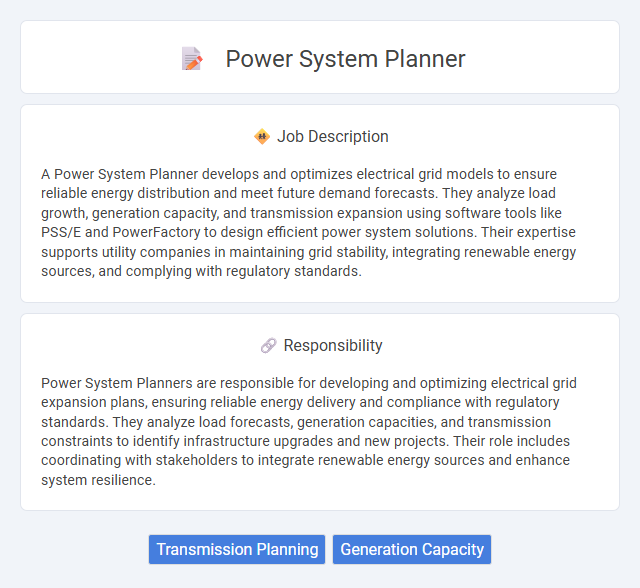
A Power System Planner develops and optimizes electrical grid models to ensure reliable energy distribution and meet future demand forecasts. They analyze load growth, generation capacity, and transmission expansion using software tools like PSS/E and PowerFactory to design efficient power system solutions. Their expertise supports utility companies in maintaining grid stability, integrating renewable energy sources, and complying with regulatory standards.
Individuals with strong analytical skills and a detail-oriented mindset are likely to thrive in a Power System Planner role, as the job involves complex system analysis and strategic decision-making. Candidates who enjoy working with data, forecasting, and problem-solving may find this position particularly suitable. However, those who prefer less technical or less structured environments might struggle with the demands of power system planning.
Qualification
Power System Planner roles require a strong background in electrical engineering, specifically in power systems analysis and grid infrastructure. Proficiency in software tools like PowerWorld, PSS/E, and ETAP is essential for load flow studies, fault analysis, and system reliability assessment. Candidates should possess excellent analytical skills, knowledge of regulatory standards, and relevant certifications such as Professional Engineer (PE) or equivalent credentials in power systems planning.
Responsibility
Power System Planners are responsible for developing and optimizing electrical grid expansion plans, ensuring reliable energy delivery and compliance with regulatory standards. They analyze load forecasts, generation capacities, and transmission constraints to identify infrastructure upgrades and new projects. Their role includes coordinating with stakeholders to integrate renewable energy sources and enhance system resilience.
Benefit
Power System Planner roles likely offer significant benefits including opportunities for career advancement and competitive salaries due to the specialized technical skills required. The position may provide job stability as demand for efficient energy distribution grows alongside renewable energy integration. Employees could also experience professional growth through exposure to complex power system modeling and planning projects.
Challenge
Power System Planner roles likely involve complex challenges related to forecasting energy demand and integrating renewable sources into existing grids. Navigating regulatory requirements and ensuring system reliability during peak loads may present significant difficulties. The position probably demands advanced analytical skills to optimize grid performance while balancing costs and sustainability goals.
Career Advancement
Power System Planner roles offer significant opportunities for career advancement through gaining expertise in grid reliability, load forecasting, and renewable energy integration. Mastery of advanced software tools and regulatory compliance enhances prospects for leadership positions such as Senior Planner or Grid Operations Manager. Continuous learning in smart grid technologies and energy market trends positions professionals for strategic roles in utility companies or energy consulting firms.
Key Terms
Transmission Planning
Power System Planner specializing in Transmission Planning develops comprehensive grid expansion and upgrade strategies to ensure reliable electricity delivery and accommodate future demand growth. This role involves analyzing load forecasts, transmission constraints, and system reliability standards while coordinating with stakeholders to optimize transmission asset investments and compliance with regulatory requirements. Mastery in power flow modeling software, regulatory frameworks, and emerging technologies like HVDC and renewable integration is critical for effective transmission system planning.
Generation Capacity
Power System Planners specialize in analyzing and forecasting generation capacity requirements to ensure reliable electricity supply and meet future demand growth. They utilize advanced modeling tools and load flow analysis to optimize the integration of renewable energy sources and traditional power plants within the grid. Expertise in capacity expansion planning and regulatory compliance is essential for developing cost-effective, scalable generation solutions that support grid stability and energy transition goals.
 kuljobs.com
kuljobs.com